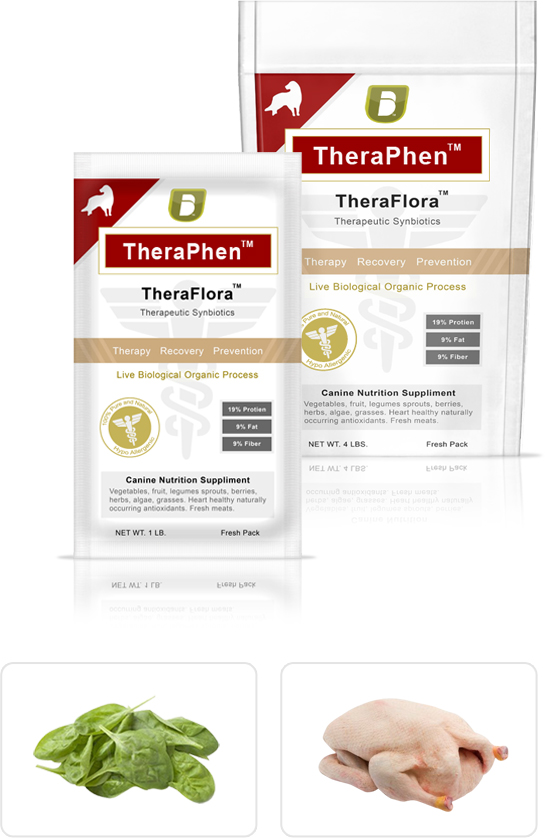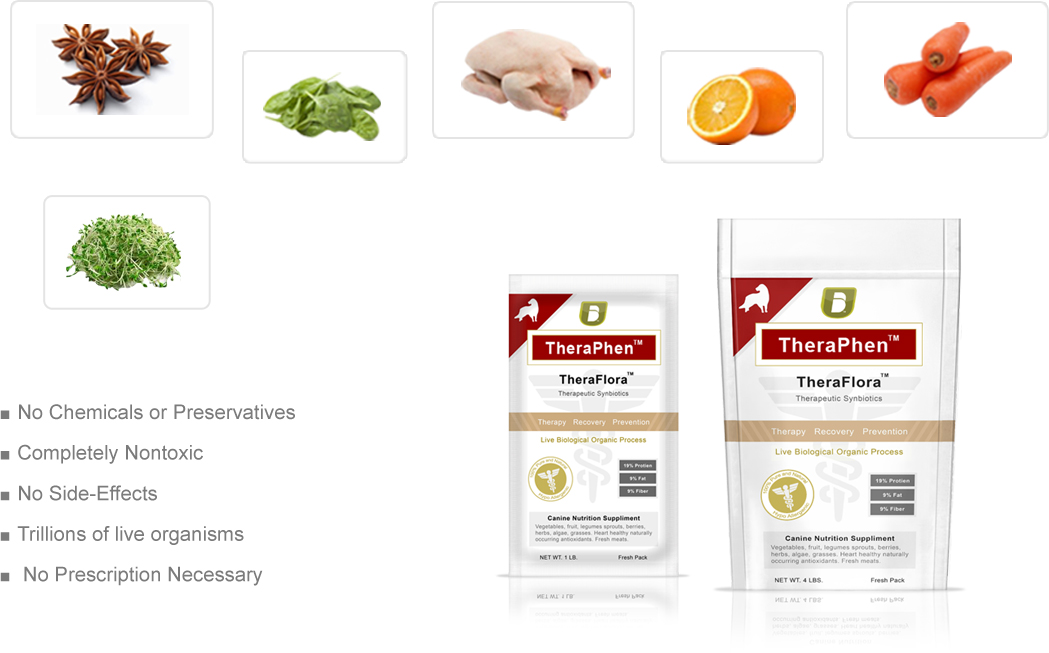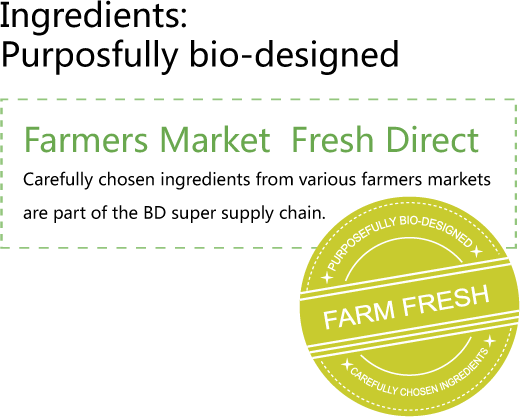theraflora_synbiotics

A SYNERGY OF PRO & PRE BIOTICS…
PROBIOTICS-ARE DIETARY SUPPLEMENTS
CONTAINING BENEFICIAL BACTERIA OR YEASTS.
Prebiotics-food substances intended to promote the growth of certain bacteria in the intestines. Prebiotics also supply nutrients for the probiotics. Synbiotics-are a supplement that contains both a prebiotic and a probiotic that work together to improve the “friendly flora” of the intestine. A synbiotic product should be considered a “functional food” rather than some obscure chemistry formulation. TheraFlora™ is a true synbiotic product, that is, functional living nutrient based supplement. Since they supply the live bacteria and the food they need to survive. However, evidentally not all such products promote symbiosis. The best synbiotic combinations currently available include bifidobacteria and fructo-oligosaccharides (FOS), Lactobacillus GG and inulins, and bifidobacteria and lactobacilli with FOS or inulins. The main reason for using a synbiotic is that a true probiotic, without its prebiotic food, does not survive well in the digestive system. To enhance viability, not only on the shelf but also in the colon, the product must allow for much greater attachment and growth rate of the healthy bacteria in order to minimize the growth of harmful bacteria. Without the necessary food source for the probiotic, it will have a greater intolerance for oxygen, low pH, and temperature. In addition, the probiotic will have to compete against other bacteria that will take over if its specific food source is not available. Therefore, a “symbiotic” product (probiotic + prebiotic = synbiotic) makes for a better choice.

PROBIOTICS DEFINED
ACCORDING TO THE CURRENTLY
ADOPTED DEFINITION BY FAO/WHO
probiotics are: ‘Live micro-organisms which when administered in adequate amounts confer a health benefit on the host’. Lactic acid bacteria (LAB) are the most common type of microbes used. LAB have been used in the food industry for many years, because they are able to convert sugars (including lactose) and other carbohydrates into lactic acid. This not only provides the characteristic sour taste of fermented dairy foods such as yogurt, but acts as a preservative, by lowering the pH and creating fewer opportunities for spoilage organisms to grow. Strains of the genera Lactobacillus and Bifidobacterium, are the most widely used probiotic bacteria. Probiotic bacterial cultures are intended to assist the body’s naturally occurring gut flora to reestablish themselves. They are sometimes recommended by doctors, and, more frequently, by nutritionists, after a course of antibiotics, or as part of the treatment for gut related candidiasis. Claims are made that probiotics strengthen the immune system. The rationale for probiotics is that the body contains a miniature ecology of microbes, collectively known as the gut flora. A number of bacterial types are thought to be thrown out of balance by a wide range of circumstances including the use of antibiotics or other drugs, excess alcohol, stress, disease, or exposure to toxic substances. In cases like these, the bacteria that work well with our bodies (symbiosis) may decrease in number, an event which allows harmful competitors to thrive, to the detriment of our health. Maintenance of a healthy gut flora is, however, dependent on many factors, especially the quality of food intake. Including a significant proportion of prebiotic foods in the diet has been demonstrated to support a healthy gut flora and may be another means of achieving the desirable health benefits promised by probiotics.
- Healthy whole fresh human grade/organic ingredients
- No heat processing or cooking
- All naturally occurring vitamins and minerals
- Hypoallergenic: no grains, no corn, soy or wheat/wheat gluten
- Dogs love the real meaty flavors intensely
- Naturally preserved utilizing our proprietary VitaMethod™
- Promotes a healthy immune system
- 5 sources of real meats
- Vegetables, fruit, legumes sprouts, berries, herbs, algae, grasses
- Heart healthy naturally occurring antioxidants
- Odorless biodegradable reduced firm ash stools
All Balance Diet™ Real Food Food products are made in the USA
Questions, need advice?

PROBIOTICS
WHICH MEANS “FOR LIFE”
THE TERM
“PROBIOTICS”
Is described as growth promoting factors produced by microorganisms (protozoa). Contrasting antibiotics, probiotics can be defined as microbially derived factors that stimulate the growth of other microorganisms. A definition of probiotics which has been widely used: “A live microbial feed supplement which beneficially affects the host animal by improving its intestinal microbial balance, the definition emphasizes the requirement of viability for probiotics and introduces the aspect of a beneficial effect on the host. Lactobacillus species have been introduced including Lactobacillus rhamnosus, Lactobacillus casei, and Lactobacillus johnsonii, because they are intestinal species with beneficial properties.
EFFECTS
It is hoped, however, that probiotics do form beneficial temporary colonies which may assist the body in the same functions as the natural flora, while allowing the natural flora time to recover from depletion. The probiotic strains are then thought to be progressively replaced by a naturally developed gut flora. Hence, probiotics have been defined as correctives of the ecoorgan. If the conditions which originally caused damage to the natural gut flora persist, the benefits obtained from probiotic supplements will be short lived.


POTENTIAL
BENEFITS
Experiments into the benefits of probiotic therapies suggest a range of potentially beneficial medicinal uses for probiotics. For many of the potential subjects-patients.
PREVENTION OF
COLON CANCER
In laboratory investigations, some strains of LAB have demonstrated anti-mutagenic effects thought to be due to their ability to bind with heterocyclic amines; carcinogenic substances formed in cooked meat. Animal studies have demonstrated that some LAB can protect against colon cancer in rodents, that the strains tested may exert anti-carcinogenic effects by decreasing the activity of an enzyme called ß-glucuronidase] (which can generate carcinogens in the digestive system). Lower rates of colon cancer among higher consumers of fermented dairy products have been observed in some population studies.
CHOLESTEROL
LOWERING
Animal studies have demonstrated the efficacy of a range of LAB to be able to lower serum cholesterol levels, presumably by breaking down bile in the gut, thus inhibiting its reabsorption (which enters the blood as cholesterol).
LOWERING
BLOOD PRESSURE
Several small clinical trials have shown that consumption of milk fermented with various strains of LAB can result in modest reductions in blood pressure. It is thought that this is due to the ACE inhibitor-like peptides produced during fermentation. Improving Immune Function and Preventing Infections LAB are thought to have several presumably beneficial effects on immune function. They may protect against pathogens by means of competitive inhibition (i.e., by competing for growth/dispalcement) and there is evidence to suggest that they may improve immune function by increasing the number of IgA-producing plasma cells, increasing or improving phagocytosis as well as increasing the proportion of T lymphocytes and Natural Killer cells. Clinical trials have demonstrated that probiotics may decrease the incidence of respiratory tract infections and dental caries, LAB foods and supplements have been shown to be effective in the treatment and prevention of acute diarrhea; decreasing the severity and duration of rotavirus infections in subjects as well as travelers diarrhea.
HELICOBACTER
PYLORI
LAB are also thought to aid in the treatment of Helicobacter pylori infections (Antibiotic associated diarrhea). A meta-analysis suggested probiotics may reduce antibiotic associated diarrhea.
REDUCING
INFLAMMATION
LAB foods and supplements have been found to modulate inflammatory and hypersensitivity responses, an observation thought to be at least in part due to the regulation of cytokine function. Clinical studies suggest that they can prevent reoccurrences of inflammatory bowel disease and decrease the risk of atopic eczema.
IMPROVING
MINERAL ABSORPTION
SYNBIOTICIt is hypothesized that probiotic lactobacilli may help correct malabsorption of trace minerals, found particularly in those with diets high in phytate content from whole grains.
PREVENTS HARMFUL BACTERIAL
GROWTH UNDER STRESS
In a study done to see the effects of stress on intestinal flora, rats that were fed probiotics had little occurrence of harmful bacteria latched onto their intestines compared to rats that were fed sterile water.
IRRITABLE BOWEL
SYNDROME AND COLITIS
B. infantis 35624, found to improve some symptoms of irritable bowel syndrome Another probiotic bacterium, Lactobacillus plantarum 299V, was also found to be effective in reducing IBS symptoms Additionally, a probiotic formulation, VSL3, was found to be effective in treating ulcerative colitis, Bifidobacterium animalis DN-173 010 may help.
SYNBIOTIC
It is also possible to increase and maintain a healthy bacterial gut flora by increasing the amounts of prebiotics in the diet such as inulin, compound As probiotics are mainly active in the small intestine and prebiotics are only effective in the large intestine, the combination of the two may give a synergistic effect. Appropriate combinations of pre-and probiotics are synbiotics.Synbiotics have also been defined as metabolites produced by ecoorgan or by synergistic action of prebiotics and probiotics e.g. short chain fatty acids, other fatty acids, amino acids, peptides, polyamines, carbohydrates, vitamins, numerous antioxidants and phytosterols, growth factors, coagulation factors, various signal molecules such as cytokine-like bacteriokines.





